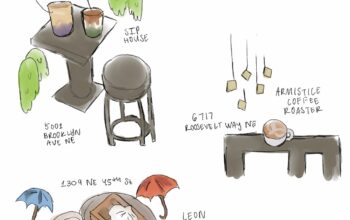A question not often talked about outside of certain groups at Roosevelt is whether language teachers must be native speakers. For some, the answer comes down to the opinions of bilingual families, or parents who are native speakers of a language themselves.
Why is having a native speaking language teacher important to bilingual families? For some, it’s a question of life experience in speaking the language. Specifically referring to the Spanish department, an anonymous student responded in a TRN survey that “they [their family] get super annoyed when the teacher gets the language wrong and how they’re teaching ‘Spain Spanish’ instead of more common Spanish.”
For others, it may be a question of influence. “Sometimes my mom points out phrases that we learn and laughs. She tells me that no one uses them where she comes from and teaches me a more authentic and often shorter way to say the phrase,” shares another student.
While it’s important to ask about having native speaking teachers, it’s also necessary to recognize the privilege that comes with the ability to ask these questions. According to The American Academy of Arts and Sciences, as of 2019 only 20% of students from K-12 in the US were studying a foreign language. In college, those numbers drop even lower to 7.5% as some schools have since removed their foreign language requirements. This, paired with a lack of motivation for some students, contributes to the decline in language courses.
The main issue is a lack of applicants, Jeane McGuire, head of the language department shares, “We’d love to hire a native speaker, but it’s really hard.” McGuire went on to share that the main way they’d received teachers in the past was through displacement and reduction (from other schools). Secondly, for some applicants, major obstacles may stand in the way. One example was a situation in which an applicant wasn’t able to accept the job, as they weren’t willing to make the move from South America to Seattle, McGuire shared.
An important factor to consider in this debate is the contents of the curriculum. According to McGuire, the Spanish courses at Roosevelt are taught with the same ‘textbook curriculum.’ While it may not offer much flexibility in the types of Spanish it teaches, it’s necessary to keep the students and more importantly teachers all on the same page with each other.
To attempt to aid native speaking students, McGuire shares that in upper levels, and for more advanced students, language teachers firstly give placement tests, which serve to assess not only the speaking skill, but also grammar skills of the student, as many at home speakers of a foreign language often don’t have the grammar skills to match, McGuire added.
As recently as 2020, recalled McGuire, the school had a program catering to bilingual and advanced Spanish speakers, run by a native Spanish speaker. This program was dubbed “Proyecto Saber,” and focused on learning about students’ own cultures and current events in the Hispanophone world. The language department has tried to restart the program for a couple years now, including this year, but has been met with the barriers of not enough applicants, not enough interest, or both, prohibiting the program from running once more.
There must be some form of balance that can be achieved to provide the support needed for bilingual students. This could present itself as a number of solutions, such as more advanced classes for those ahead of the curve like those provided through the international baccalaureate program at Roosevelt’s neighboring school, Ingraham. Though this may prove difficult with an unknown amount of interest and the difference in Roosevelt and Ingraham’s curricula, as Ingraham is an IB (international baccalaureate) school, it may prove worth it in the future.
Though Roosevelt may not currently have certain desired aspects to its language programs, it’s important to acknowledge that effort is being put in, and that trying to cater to these needs is no easy feat. In the meantime, it’s important to appreciate RHS’s language teachers for what they already do, and not to devalue their hard work.


